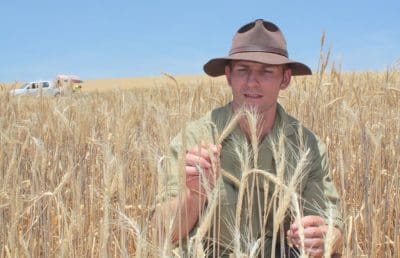CENTRAL WEST New South Wales has featured in an expansive project spanning nine countries, four continents and both hemispheres, as part of global efforts to develop perennial cereal crops.

NSW DPI researcher Richard Hayes inspects a perennial wheat crop growing at Cowra as part of a global project.
NSW Department of Primary Industries (DPI) researcher, Richard Hayes, said some of the most successful perennial wheat lines in the worldwide project were grown at Cowra.
“Good seasonal conditions over several years saw some wheat lines grown at Cowra persist and yield grain for four successive years,” Mr Hayes said.
The project has included 21 experiments in Australia, Italy, Turkey, Nepal, the United States, Canada, Sweden, Uzbekistan and Russia, and crop performance has varied greatly.
“These trials have helped inform future breeding strategies, and highlight the need to target specific environments rather than one generic product for one global market.
“Our data highlights the importance of using locally adapted material to develop superior lines of perennial cereals for specific environments.
“In some situations, perennial crops from barley or rye lines may be more successful than wheat lines.”
Kernza is a perennial grain developed by the The Land Institute in the US, and has come out of research from the study.
It is now commercially available in a staged US release to a beer-brewing company and selected restaurants.
Mr Hayes said farming systems based on perennial cereal crops offered the potential to boost sustainability and increase flexibility for farmers by offering grain and grazing options.
“Perennial cereals could help farmers adapt and better manage climate variability. In marginal cropping areas, particularly in drought years, perennial wheat may allow farmers to
vary their inputs, reduce costs and deliver environmental benefits.”
Perennial crops can take advantage of out-of-season rain, which helps increase water-use efficiency, reduce soil acidification and salinisation, and has the potential to reduce erosion.
Click here to read Mr Hayes’ paper on global perennial wheat research.
Source: NSW DPI



HAVE YOUR SAY